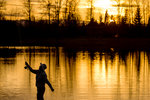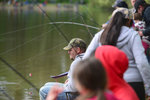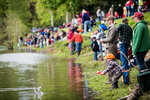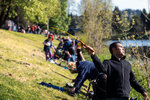






The Washington Department of Fish and Wildlife is about to make a big splash at Fort Borst Park Pond and South Lewis County Park Pond.
Bait-slinging trout anglers have been calling for an increase in fall trout fishing opportunities, and the WDFW has plans to oblige those requests by stocking more than 915,000 trout in Washington lakes and ponds this fall.
On the local rod and reel scene, Fort Borst Park Pond and South Lewis County Park Pond are both slated to receive shipments of 2,000 rainbow trout between Nov. 21 and Nov. 23. The trout headed for Lewis County are what the WDFW calls “catchable size,” and will weigh an average of 1.25 pounds each.
“When they stock it like that, they’re both very, very popular fishing holes, especially with the kids,” said respected reel talker Jerry Barr, at the Sunbird Shopping Center fishing desk in Chehalis.
For the uninitiated, South Lewis County Park Pond and Fort Borst Park Pond are two of the most popular fishing holes around, and they just happen to sit at opposite ends of the county.
Toledo’s South Lewis County Park Pond is a 14.1-acre billabong along the Cowlitz River. The former gravel pit is fishable by boat or from the bank, with numerous island-like stone piles that create additional bird and fish habitat.
Often referred to simply as South County Pond, it is regularly stocked with rainbow trout as part of Tacoma Power’s mitigation agreement to offset the loss of fish habitat caused by the power generating dams on the Cowlitz River. In 1996, grass carp were introduced in order to help control outbreaks of invasive Eurasian milfoil. The carp rarely bite on common trout bait but anglers that do unintentionally catch them are required to toss the grass eaters back so that they can continue their underwater-groundskeeping efforts.
Other fish species that anglers may encounter include black crappie, bluegill, brown bullhead, coastal cutthroat, largemouth bass, pumpkinseed, sculpin, suckers and tiger muskies. Tiger muskies must be a minimum length of 50 inches in order to be harvested.
“The most common thing that people use, that I know, is either worms or powerbait,” noted Rick Lovell, owner of Lovell’s Flying K Gas Station in Toledo. “It’s basically just fishing for trout in a lake. They’re either fishing off the bottom or with a bobber.”
Lovell says he has plenty of visitors come into his store looking for the perfect fishing setup, particularly in the spring when the pond also receives loads of rainbows. Adding to that frenzy, each spring, typically in May, the Toledo Lions Club hosts a youth-only fishing derby at the pond and doles out prizes to participating anglers.
South County Pond is open almost all year round. The one exception begins each year on the Monday before Thanksgiving, when the pond is shuttered for the rainbow stocking effort. The pond reopens the day after Thanksgiving for the “Black Friday” opener.
At just 4.9 acres, Centralia’s Fort Borst Park Pond is a considerably smaller body of water but offers similar opportunities and results for anglers of all ages. Previously, Fort Borst Pond was a juvenile only fishery, but in recent years it was expanded to include lip rippers of every vintage. Like South County Pond, Fort Borst Pond is also located on the footprint of a former gravel pit and managed for rainbow trout and other warmwater fish species.
Unlike its south county relation though, Fort Borst Pond is only open from the fourth Saturday in April through the end of February. Typically the lake is stocked with catchable rainbows in late December/January and then again prior to the April opening date. Just like South County Pond though, Fort Borst Pond is closed from the Monday prior to Thanksgiving until the Friday after the feast in order to facilitate the stocking of the 2,000 catchable size rainbow trout in advance of the “Black Friday opener.”
In addition to the well stocked rainbow population, Fort Borst Park Pond also boats populations of bluegill and sculpin.
Back at Sunbird, Barr says that no matter which county park pond you decide to cast a line at you’re likely to have success. He recommends wrapping your hook with “all the usuals. The power baits, the power eggs, spinners, rooster tails and what-not. They all work real good in those places, especially after they stock it.”
“They’re not lure bait shy,” added Barr. “You could do nightcrawlers under a bobber or plunking off the bottom with the floating trout bait.”
On the opening day of each spring, the Centralia Lions Club sponsors a youth-only fishing derby at the pond, which includes door prizes, helpful fishing assistants and loaner gear for those without their own rods and reels.
Barr said that the Lewis County park ponds are a great place for novice anglers to get hooked on the sport, and he typically has a steady stream of folks coming by the shop looking for the lowdown on the Lewis County lunkers. Oftentimes Barr will wind up rigging up the entire rod and reel setup, as well as a backup or two for the inevitable snag.
“I get a lot of single moms that come by. They’ve got kids that want to go fish but they don’t know how. They’ll bring in their rod and I’ll set it up for them,” said Barr, who noted that, over the years, he’s taken more than a few families out for a guided introduction.
“We always take the time to tie people up and explain to them how it’s working. It’s very rewarding,” insisted Barr. “They come back raving, ‘We’ve never caught a fish like that before!’”